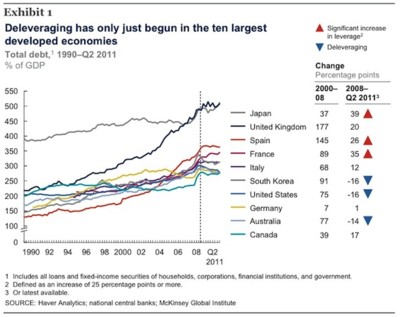Sample:

Here.
|
|||||
Whether Guido is right that there is any hope for the deficit, under any circumstances, is a proposition I leave to others to ponder. I quote the above posting because it illustrates something important about Guido himself. In among all the knockabout gossip about who is sleeping with whom and who is cheating on their expenses, Guido regularly slips in more thoughtful stuff. He regularly, that is to say, drops in explicit libertarian messages, in among all the merely implicit libertarianism about how they are all conspiring with each other to rob us blind. This is why they all hate him so much. He is absolutely not one of them. They want to believe that he is only a gossip monger, and a mere partisan Tory, with no principles other than that he wants his particular team to be in charge of all the robbing and conspiring. But those of his pro-state (I often think more fun than is might be had with that hyphen) enemies and victims with any antenna or honesty know that he is something far more dangerous to them than that. He is a principled libertarian with readership numbers and influence most of them can only dream of. He, more than anyone else in Britain, is responsible for the widespread perception in British politics that the arrival of the internet was a breakthrough for libertarian ideas. Before Guido, we were talking amongst ourselves, which was good. Now Guido regularly shoves it in front of them, which is even better. Okay, a simplification. Others were doing this before Guido. But none so entertainingly, or to such a wide readership. One of Samizdata’s prouder boasts, I think, is that before Guido found his own blog persona and his own voice as a blogger, he was briefly part of ours. Here is a photo I took of the great man, at a recent gathering at Samizdata HQ: A fine if rather blurry addition to this collection. (This is my favourite one of these.) By the way, do you remember the posting I did here a while back about how so much of what happens in the world is down to two-man teams? Well, these days, anyone who cares knows that there are now two Guidos. I asked original Guido about this at the party where I took the above snap, and the partnership between him and Harry Cole is definitely the real two-man team deal. Katharine Birbalsingh is an heroic, principled woman who, against hideous odds, is trying desperately to open a free school – the Michaela Community School – in a part of South London woefully ill-served by state secondary schools. It will provide academic rigour, discipline, a liberal arts curriculum including Latin, uniforms, sporting facilities and extended school hours to children in one of the most deprived parts of London, regardless of race or social class or ability to pay. For those children whose parents can’t afford to go private, the school will be a godsend – possibly the single thing that makes all the difference in their life between success and failure. Does it constitute a strong, persuasive argument against this project that Katharine Birbalsingh has a name which you can twist with an unfunny pun? Or that she’s disliked by some of her colleagues? Or that, in the eyes of her accuser, she speaks “BS.”? No, it doesn’t. Indeed I’d suggest that these comments are actually counterproductive. They draw attention to the fact that criticism of Katharine Birbalsingh’s noble project is based not on reasoned argument but on prejudice and incoherent rage. This is why they’re so well worth quoting: because they let the enemy do our work for us. – Delingpole comments on a comment. Mark Wallace, recently “seen elsewhere” by Guido, makes a good point, in response to a piece by Tim Leunig in the Guardian, about the nature of the mixed housing economy:
Government hand-outs to “the poor” enriching the not-so-poor is a familiar story. It explains a lot about the current state of politics. In fact politics generally, down the ages. Michael Jennings is now, as he recently said here that he would be, in Israel. Knowing my fondness for amusing multilingual signs, he today emailed me this photo, taken in Acre:  At first I thought that “Crusader” was some kind of business brand, although on second thoughts probably not. Maybe … actual crusader latrines? To clear up any doubt, Michael added:
Yes indeed, these are latrines which were once upon a time used by crusaders. And here, I presume, are those very latrines. Don’t you just love the internet? As I’ve recently been mentioning here, I have lately been doing lots of clearing out of junk from and organising of my home, which is a very satisfying activity. While doing this today, I had another of those haven’t-things-been-progressing-a-lot-lately? moments:  The point being that that’s 16 megabytes. Not gigabytes, megabytes. This thing came with one of my earlier digital cameras, from about eight or nine years ago, and in fairness 16mb was rather stingy even then. The card could only have accommodated four photos of the size of the photo I just took of it. I seem to recall an earlier moment of this sort, also recorded here, and also involving an SD card. Yes. Despite all the financial woe we are now suffering, this kind of progress still seems to be hurtling along. Just wait until I get stuck into all those back issues of Personal Computer World that I also find I still have. Mr. Sachs here performs the equivalent of, say, accusing someone who advocates sobriety of thereby being indifferent to other values such parental responsibility, financial prudence, and neighborliness. But just as being sober in no way precludes – and likely promotes – other values such as parental responsibility, being a libertarian in no way precludes any of the values and causes that Mr. Sachs lists. Indeed, libertarians argue that these other values and causes are best promoted by individual liberty, and that too many people who insist that achieving these other values requires the suppression of liberty are cynically seeking convenient cover for their own self-aggrandizement. Of course, libertarians might be mistaken about liberty’s merits. But that Mr. Sachs presumes that libertarians hold cheap such values as compassion, civic responsibility, and honesty proves that what Lord Acton wrote about Robert Kemp Philp’s description of history applies perfectly to Mr. Sachs’s description of libertarianism: “It were well if he knew his subject as well as he knows his own mind about it.” – Two quotes there from Donald J. Boudreaux (responding to this). There is his own own eloquence, and there is the Acton quote at the end of what he himself says. Tom Clougherty has an interesting graph up at the ASI blog, taken from this McKinsey report, of the movement in combined public and private debt for the ten biggest of the world’s developed national economies, from 1990 until now. Follow either of the above two links to get a bigger and more legible version of this graph:  Since 2007, of course, all have lurched upwards from wherever they were to quite a bit more. To me the interesting bits are those between 1990 and 2007. The general trend was a general increase in debt, from somewhat troubling to somewhat more troubling. But three countries bucked this trend: Japan started very bad and merely stayed very bad; Canada started okay-ish and stayed okay-ish; Britain started okay-ish but became very bad. In terms of the direction things went in, Canada has the best graph of them all, and Britain has the worst. Between them, these three graphs, the grey one along the top (Japan), the green one in the pack towards the bottom (Canada), and the dark one moving most determinedly upwards (Britain), make a kind of big and elongated Z. One other deviation from the norm worth noting is that just before 2007, Germany, unlike any other country, went (see the yellow graph) definitely downwards. It did what Keynes said, in other words, and paid down its debts when times were good, or at least when they seemed good. In Britain, the “Keynesians”, public and private, just carried on running up more debt. I know that as a fan of Austrianism I am not supposed to get too excited about national economic aggregates. But this set of aggregates and aggregate movements looks to me quite telling. Make of it all what you will. For me, it confirms the sense that many now have that Tony Blair’s government was one of the worse ones that we’ve ever had. Yes. This … … has finally moved out of my home, and out of my life. Last week, Men collected it and took it … I don’t know where. A dump, presumably. I recently wrote here about the continuing life of physical books and about the limitations of the idea of the paperless office or paperless home. Office-working commenters piled in to describe the persistence of paper in their offices, often in the teeth of earlier diktats from on high to the contrary. But as far as my own libertarian activities are concerned, I really have pretty much completely abandoned communicating on paper, with my own writing, and most definitely with anyone else’s. Which means that this machine, with which I once processed all the paper that I once processed, really had to go, if only to help me to accommodate my ever increasing hoard of books. Only inertia had caused the photocopier to linger on, in my kitchen. That, and the affection I still feel for something which once made such a difference to my life. A simple way of describing what this machine did for me, and for a small gang of mostly London-based libertarians, from the 1980s until the early 2000s, is that it enabled us to do something like blogging, before there was blogging. → Continue reading: My photocopier – 1981-2012 Comment just attached, by “Malcolm”, to my posting here a while back entitled Austrianism as Number Two:
I did get automatically notified of this comment. Many thanks for the kind thought. However, I also clocked this Newsnight snippet myself, and added an off topic bit in a comment I also added to the earlier posting today about SOPA, which Newsnight is also reporting on, thanks to the Wikipedia black-out that Rob Fisher noted. The more I ponder those Keynes v Hayek videos, the more of a stroke of total genius I believe them to be. They play especially well with the BBC, because the BBC is never happier than when explaining an issue in terms of competing arguments. Yes, the BBC is often “biased”, in the sense that you get a definite idea of which team they may prefer (which may not be yours), and which team they choose to give the last word to. But the “other” team often gets a more than fair crack of the whip. As I made clear in that earlier posting of mine, the real sufferers from this kind of bias are the “other other” teams, so to speak, the ones who don’t even get a look in, the ones who are shown as being not even wrong, on account of not even existing. To quote Rob Fisher in the posting immediately below, about Detlev Schlichter’s performance on the BBC’s “Start The Week” show yesterday morning:
Which adds up to two consecutive not bad days for the spreading of Austrian ideas. Phyllis Dixey – 1914 to 1964 – Striptease Artiste – lived here in flat number 15. – The wording proposed last November for a new British Heritage blue plaque, but it proved controversial. I only just came across this story. Since then, I don’t know what has happened. Is this plaque actually going to materialise? What it says at the bottom of this recent news item, about another proposed blue plaque in honour of movie actress Margaret Lockwood, suggests not. If not, shame. |
|||||

All content on this website (including text, photographs, audio files, and any other original works), unless otherwise noted, is licensed under a Creative Commons License. |
|||||